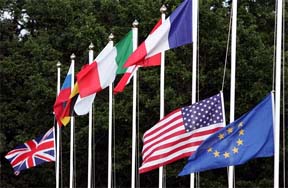G8: Russia takes the lead
Russian Federation assumes G8 Presidency in 2006

Today the Russian Federation takes on the Presidency of the G8 for the first time, a chance for President Vladimir Putin to underline Russia's importance as a key player on the international stage, as part of an ongoing process of growing prestige the country has enjoyed since he took control of the its destiny six years ago.
The new role performed by the Russian Federation will allow this giant the chance to assume its rightful position as a major player on the world stage as regards both its external and internal policies.
Externally, the Kremlin can stress Russia's role as a defender of a multi-lateral approach to crisis management based upon the rule of law and not lies, deceit and blackmail and using the UN Security Council as the forum for dialogue, discussion and debate, not belligerence and bullying, the Bible and the bullet. While some nations have not thought twice about breaking international law, breaking the UN Charter and breaking the Geneva Conventions while carrying out the most shocking acts of butchery, Moscow, alongside Berlin, Paris, Brasilia, Beijing and others, has pressed for a world order based upon international law and respect for the terms of treaties, charters and conventions signed.
Russia can also take the opportunity to present its important reserves of oil and gas as a strategic asset for the future, upon which larger economies will rely.
Internally, Russia will benefit from the feel-good factor as its citizens see their country's resources controlled by Russians and not foreigners and see their country at the hub of international affairs, enjoying a status which had been missed since the heady days of the Soviet Union.
The issues
One of the main issues to be approached during the Russian presidency is the energy sector. President Putin has already announced that Russia favours negotiations which provide beneficial terms to both suppliers and consumers; the diversification of energy sources, including a reinforcement of the quest for environmentally-friendly resources and the development of new technologies to explore this sector; measures to improve the transportation and storage of fuels; the development of nuclear power.
Other issues on the agenda will continue to be questions discussed during the UK Presidency (2005), such as the fight against terrorism, the health sector and measures to combat AIDS, TB and malaria, non-proliferation, crisis management for conflicts and aid for developing countries – here President Putin will bring the plight of former Soviet states to the attention of the international community (states which formerly lived comfortably within the USSR are now facing dire situations under the new model of monetarist market-oriented capitalism).
Hostile press
Western press outlets continue their barrage against the Russian Federation, some of them showing a hostility which borders on the hysterical. For instance, some describe the terrorist leader Aslan Maskhadov as having been the “Chechen rebel president”, a designation paramount to calling bin Laden a freedom fighter. Others complain about Russia's aid to Iran, while all Moscow is doing is ensuring that Teheran manages its nuclear power programme in accordance with international law.
What if Iran had declared that Iraq had weapons of mass destruction and launched an illegal invasion, perpetrating acts of torture and slaughtering tens of thousands of civilians?
It is this biased, unbalanced, unipolar world in which a handful of Anglo-Saxon nations have an inflated notion of their own importance in which Russia, as President of the G8, has the chance – and the obligation – to make its mark in 2006.
Discuss this article on Pravda.Ru English Forum
Subscribe to Pravda.Ru Telegram channel, Facebook, RSS!


